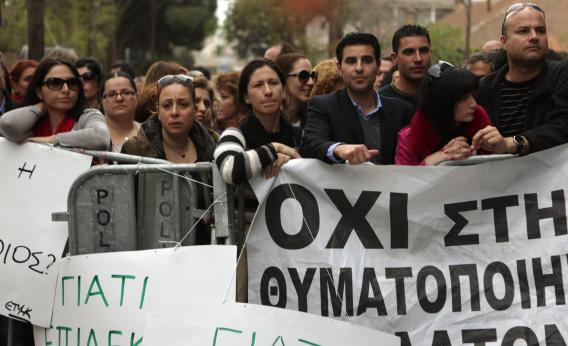The metaphysical riddle over whether the imposition of capital controls in Cyprus means Cyprus has in effect already left the euro is a great window into the key lesson of this eurozone crisis: You can’t have a currency union without a banking union.
The idea of a currency union is that one currency unit is the same all throughout the territory of the union. But one thing that gives a bank deposit money is the existence of deposit insurance and other forms of explicit and implicit guarantees. But since different European countries have different fiscal capacities to back up their banking systems, it’s already not the case that a Greek euro and a Finnish euro are identical. When you put a euro in a Greek account you’re running the risk that at some future point the Greek government will acceed to Troika demands to impose a haircut on your claim, or else that the Greek government will refuse to give in to Troika demands and you’ll end up with an account full of New Drachmas.
In the United States we’ve seen three Florida banks fail in the past six months but nobody thinks Florida bank failures will cause the state of Florida to go bankrupt. That’s because the F in FDIC stands for Federal. To have a real monetary union, Europe needs a unionwide system of deposit insurance (or lack of deposit insurance) and generally speaking a continentwide policy on the resolution of failed banks.
But naturally German politicians aren’t going to want to put German taxpayers on the hook for failures of prudential bank regulation in Portugal (not that German banks are well-regulated, mind you, but Germans seem to think they are). To have common deposit insurance you need a common bank regulator. And the deposit insurance policy needs to be backed up by some kind of fiscal policy agent that can issue debt that, like U.S. Treasury bonds, carries no default risk.
Those are tough things to put together, and they’re especially tough to put together on the fly. I can hear the Dutchman on the street saying this all sounds well and good, but isn’t it really just a way to transfer some of my money to Spain? And he’s not wrong. That’s exactly what the effect would be. But it’s still the only way to make the currency union workable, and officials throughout the EU keep saying they want it to work. And why shouldn’t they? For all the horrors of the past five years, the European Project continues to be one of the noblest undertakings in political history. It’s been remarkably successful at consolidating democracy in Portugal, Greece, Spain, and now a large swathe of Central Europe and into the Baltic states. Making it work is hard, but it should be possible.
